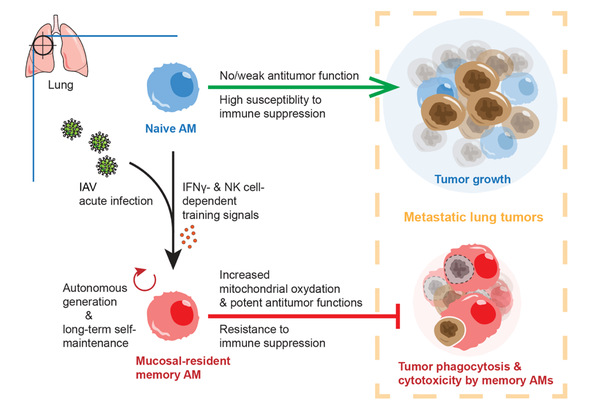Influenza trains alveolar macrophages to fight cancer
The lung is exposed to a variety of respiratory viruses such as influenza, and is also a frequent target organ of both primary and metastatic cancers. Respiratory viral infection was previously shown to induce immunological training of lung tissue-resident alveolar macrophages (AMs) with enhanced anti-bacterial functions. It is however not clear whether previous training experience of AMs by respiratory viral infections is important to anti-tumor immunity in the lung.
On February 20, a group of researchers led by Dr. YAO Yushi from Zhejiang University School of Medicine published a research article entitled “Influenza-trained mucosal-resident alveolar macrophages confer long-term antitumor immunity in the lungs” in Nature Immunology, indicating that acute influenza infection induces long-lasting anti-tumor trained immunity in self-sustaining resident AMs.

In their study, the researchers found that acute influenza infection in mice endows long-lasting anti-metastatic immunity in the lung which is mediated by influenza-trained AMs. Trained AMs exert tissue-specific anti-tumor immunity via enhanced tumor cell phagocytosis and cytotoxic functions, which depend on their enhanced mitochondrial oxidation of fatty acids and glucose. Intriguingly, the researchers identified human AMs with trained immunity traits in non-small cell lung cancer tissues that are associated with a favorable immune microenvironment.
This study sheds light on tissue-resident macrophages as a potential target of trained immunity-based anti-cancer strategy with long-term effects, which is particularly appealing in individuals with extrapulmonary cancers, such as melanoma and breast cancers, with high risks of lung metastasis. “We believe that training tissue-resident macrophages is a promising prophylactic and also possibly therapeutic anti-cancer strategy that deserves further investigation” said WANG Tao, the first author of the paper and a PhD student with Prof. YAO.
Source: School of Medicine, Zhejiang University